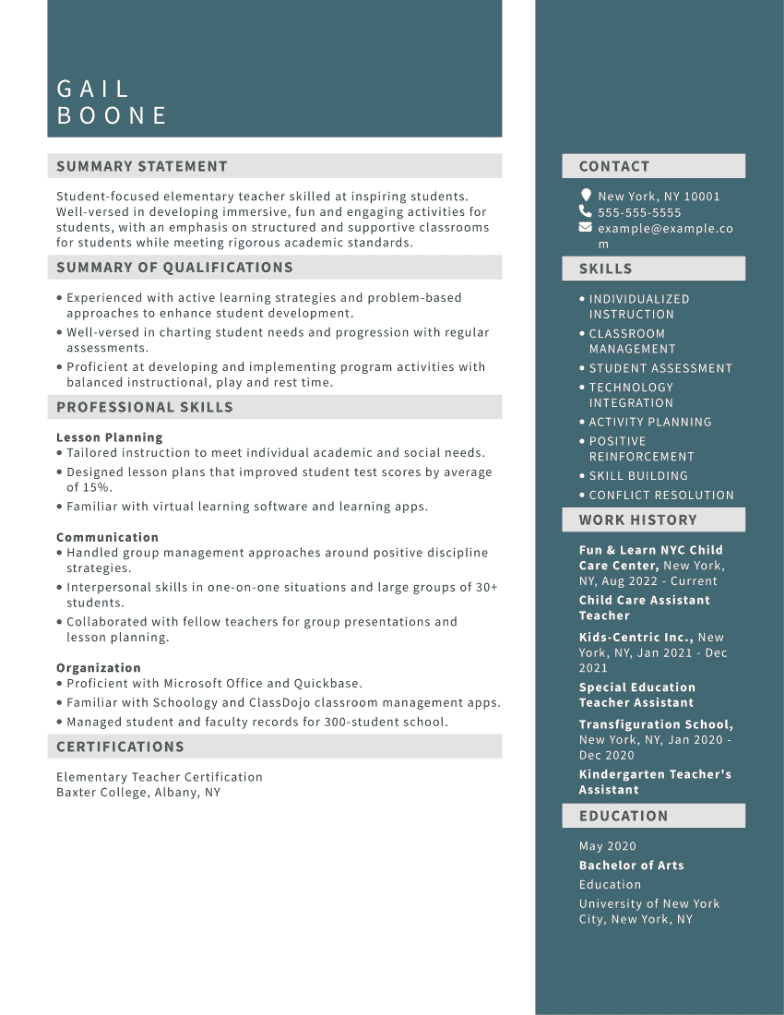Functional Resumes Feature Your Skills When Experience Is Limited
A functional resume can be a lifesaver for job applicants who don’t have a lot of experience in a particular industry. Follow our tips for writing a functional resume that gets you noticed.
Our customers have been hired by*:*Foot Note

Is the functional resume format right for you?
Of the three types of resumes, a functional resume displays your skills most prominently, emphasizing abilities and qualifications that will help you benefit the company you’re applying for. But is the functional resume the right choice for your resume and are you creating it so it will impress a potential employer?
On this page, our experts will provide you with:
- A thorough explanation of when to use a functional resume.
- Tips on how to create a strong functional resume.
- Functional resume templates and examples to help you get started.
What is a functional resume?
A functional resume is a resume that prioritizes the skills section over your work experience. Unlike a typical resume that highlights work experience in chronological order, this skills-based resume emphasizes a candidate’s best skills, relevant for the job position being applied for. It’s a great way to show that you have the skills to perform the job requirements.
- Emphasize your most important and relevant skills
- Categorize your skills under areas of expertise
- List examples of how you achieved success with those skills
When to use a functional resume
When should you use a functional resume? A functional resume works best in these situations:
- You have an employment gap in your career that is difficult to explain
- You’re pursuing a career change
- You’ve recently graduated
- You have internships rather than previous jobs in your work history
It’s also typically best to use functional resumes for jobs that place a premium on skills rather than experience, especially when you’ll be able to physically hand your resume to someone, rather than submitting the resume to an automated system. An applicant tracking system (ATS) does the resume scanning for a busy hiring manager, it searches for specific keywords from the job description to select the most qualified candidates. The lack of using those keywords in a prominent work experience section on a functional resume does not give the ATS system enough wording to scan. Therefore, functional resumes don’t rank well with keywords, so they don’t work well for ATS systems.
Build my resumeFunctional resume vs. chronological and combination resumes
There are three main types of resumes: functional resume, chronological resume and combination resume. Here are some descriptions of each to help you decide which structure works best for you.
Chronological Resume
The chronological resume format prioritizes your work history, which is typically placed near the top of the resume. Work experience is listed in reverse-chronological order with most recent jobs first. This is a great type of resume if you have a lot of experience in the field you’re applying for.
Chronological Resume Format
- Header
- Summary
- Skills
- Work experience
- Education
Job Seekers That Benefit from Chronological Resume
- Job seekers with experience
Combination Resume
A combination resume is a combination of a functional resume and a chronological resume. In contrast to a functional resume, it provides a bit more information about your work history.
Combination Resume Format
- Header
- resume summary
- Skills
- Work history
- Education
Job Seekers That Benefit From Combination Resumes
- Large gaps in employment
- Looking to make a career change
- New job doesn’t match well with employment history
- Never had a job title as the one for which being applied
Functional resume format: writing tips
What is the structure of a functional resume? Typically, there are four sections you’ll use when building your functional resume. Here’s the easy path to a great functional resume.
1. Summary
To write a resume summary on a functional resume, include two or three sentences that highlight your best skills, qualifications and experience relevant to the job you’re applying for. If you’re changing careers, you want to mention transferable skills that will help you perform the new job.
Summary example:
Hard-working assistant teacher brings student-focused teaching to address student needs, assessments and curriculum development. Dedicated to maintaining effective parent communication and faculty collaboration.
2. Skills
In this section, feature your most relevant skills in subcategories. For example, you can separate your hard skills and soft skills into categories like Communication, Technical, Organizational and Leadership. Within each category, list 3-4 of your most important skills as they relate to the job you are applying for.
Skills example:
- Relevant teaching skills
- Adapts teaching methods to meet students’ needs and interests.
- Provides differentiated instruction and curriculum adjustments.
- Fluent with planning lessons and instruction for classrooms and individual settings.
3. Relevant professional experience
On a functional resume, your work history section will only include relevant experience. If you’re pursuing a career change, include jobs with transferable skills and point out how you used these skills in the job.
Professional experience example:
Teacher Assistant, Sept. 2021 – Present
Smallville Elementary School, Smallville, ND
- Assisted head teacher with an effective learning environment for 22 students.
- Helped develop creative teaching strategies to meet the needs of students.
- Acted as substitute teacher for physical education, music and art when needed.
4. Education
In your education section, include information about where you went to college, as well as any other relevant training and certifications. If you have college experience, do not list high school experience. Only mention a high school diploma if you lack college.
Education example:
- Studying for Bachelor of Education
- Adelphi University, Garden City, NY
- Expected Completion: May 2024
Functional resume templates
ResumeHelp has numerous resume templates you can use to write a functional resume that will stand out among the competition. The templates are a great way to start and show you exactly what sections you need to complete.
Here are some of the most popular functional resume templates:
- Empire
- Splendid
- Gazelle
- Akimbo
- Kingfish
- Angora
Once you find a template that works best for you, be sure to look at the ResumeHelp resume examples for reference. There are 50,000 resume examples so you can find your specific job role in your chosen industry and see exactly how others worded all sections of their functional resumes. Even better, use the ResumeHelp resume builder to guide you through the writing process.
Functional resume example
FAQ: Frequently Asked Questions About Functional Resumes
Have questions? We’re here to help.
What are the features of a functional resume?
A functional resume has more details about your career-related skills and less details about your work experiences. Sections of a functional resume include contact information, summary, skills, relevant professional experience and education.
What are the disadvantages of using a functional resume?
While a functional resume prominently focuses on your best and most relevant skills, it doesn’t spell out your work history as a direct approach that hiring managers and recruiters will understand. Also, the lack of keywords that would typically be incorporated into the work experience section, can hurt a candidate’s chances of getting scanned successfully by the applicant tracking system (ATS).
How do you write a functional resume?
Your hard skills and soft skills are the main focus of your functional resume. In addition to featuring a bulleted list of technical skills, you also want to include other relevant skills with a one sentence description about how you performed the skill.
Who should use a functional resume?
A functional resume works best for job seekers going through a career change, those with gaps in employment history and entry level applicants lacking work experience. This type of resume is great for a retiree returning to the workforce as well as a stay at home mom or dad returning to work.
Couldn't find the answer you're looking for?






